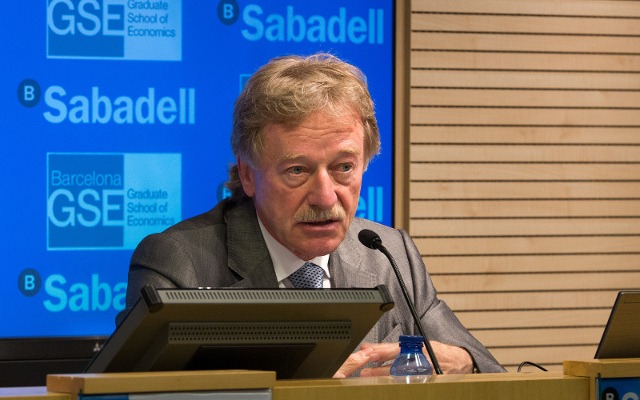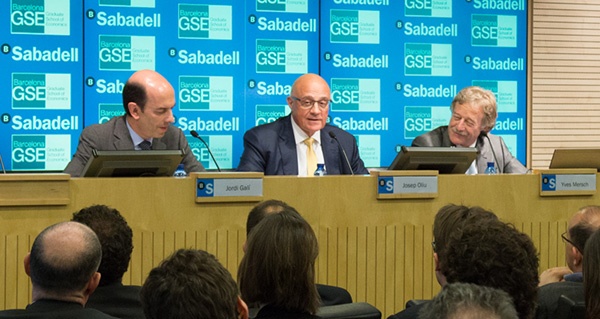research
ECB's Yves Mersch offers the central bank's perspective on Europe's debt crisis

Yves Mersch, Member of the Executive Board of the European Central Bank, delivered the 32nd BSE Lecture, "Overcoming the crisis: a view from the European Central Bank," at Banc Sabadell on May 7, 2015.

From left: BSE Research Professor Jordi Galí, Banc Sabadell President Josep Oliu, and our speaker.
Video: Yves Mersch, BSE Lecture Recap
In his lecture, Mr. Mersch shared reflections and insights on the Euro area from the perspective of the ECB's leadership.
A summary of Mr. Mersch's reflections follows:
The European debt crisis painfully disclosed weaknesses in the institutional set-up of the Euro area.
The accompanying recessions and diminishing price pressure forced the ECB repeatedly to act forcefully to fulfill its mandate. By doing so, we have taken both conventional and unconventional measures. In January 2015, the Governing Council launched an expanded asset purchase program to combat the heightened risks of too prolonged a period of too low inflation and to stop the fall of inflation expecations.
The short-term economic outlook for the Euro area is currently brighter than it has been for several years. But nascent recovery cannot be an excuse for governments to rest. The improved financial conditions do not substitute for structural reforms but pave the way for their successful implementation.
The forceful monetary accommodation is unconventional and temporary. We will ensure that – to safeguard price stability no matter what.
This mandate is enshrined in the Treaty. To be an independent but rule-based institution is a curse and blessing at the same time. On the one hand some might wish that we step in to solve or mitigate structural problems by printing money. But our rules are not negotiable to the perceived benefit of interest groups or individual countries. Nor can financial stability considerations or stretched national budgets trump our primary objective. One the other hand, we are reliable and predictable insofar as monetary dominance will always prevail.
A lot of work has been done to overhaul the institutional architecture, from the establishment of a Banking Union, a permanent crisis management mechanism and a strengthening of the fiscal and macroeconomic rulebook to the design of a Capital Markets Union.
But neither must we put the wheels into reverse nor allow for a standstill. Continuous effort is needed to improve the governance of structural reforms and develop a strategy for dealing with increased private and public risk sharing. By doing so we must distinguish between shorter-term solutions within the given rules and longer-term approaches which might require Treaty changes.
About Yves Mersch
Yves Mersch is a member of the Executive Board of the European Central Bank. Previously, he served on the Monetary Committee of the European Communities, the Board of Directors of the European Investment Bank (EIB), and was Alternate Governor of the World Bank and the European Bank for Reconstruction and Development (EBRD). He has also served in advisory positions at the United Nations and the International Monetary Fund. In his home country of Luxembourg, Mersch has held several high-level positions in the central bank, treasury, stock exchange, banking supervisory authority, and ministry of finance. He holds postgraduate degrees in Political Science and International Public Law from University Paris 1 Panthéon-Sorbonne.
About the BSE Lecture Series
Organized with support from Banc Sabadell, the BSE Lecture Series brings some of the world's top scholars in Economics to Barcelona to share their research with the School community.
